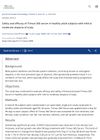Estrogens and Human Scalp Hair Growth: More Questions Than Answers
March 2004
in “
Journal of Investigative Dermatology
”
estrogen 17-ß-estradiol E₂ telogen effluvium androgenetic alopecia anagen phase hair shaft formation keratinocyte proliferation estrogen receptor expression aromatase activity regional estrogen metabolism estrogen estradiol E2 hair loss female pattern baldness hair growth phase hair shaft skin cell growth hormone receptor enzyme activity local estrogen metabolism

TLDR The effects of estrogen on human hair growth are unclear and need more research.
In the March 2004 document, the authors explored the ambiguous role of estrogen, particularly 17-ß-estradiol (E₂), on human scalp hair growth. They noted that while estrogens typically inhibit hair growth in mammals, their effect on human hair is not well-defined. The document mentioned the use of topical E₂ for hair loss conditions like telogen effluvium and androgenetic alopecia in women, suggesting that E₂ might inhibit hair shaft formation but extend the anagen phase, which could benefit conditions like telogen effluvium. However, the complexity of hormonal fluctuations during events such as pregnancy makes it challenging to determine E₂'s specific effects. The authors presented a study involving hair follicles from a single 46-year-old healthy male, which indicated that E₂ could stimulate hair shaft elongation and keratinocyte proliferation, challenging previous beliefs. This finding highlighted the need for further research to clarify the influence of factors like estrogen receptor expression, aromatase activity, and regional estrogen metabolism differences on hair growth responses to E₂.






